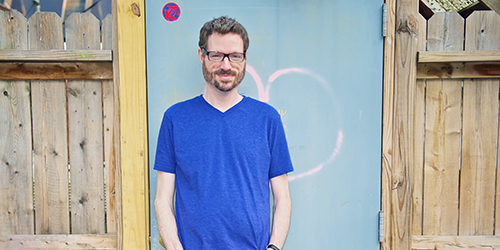By Christopher J. Treacy

Disco aficionado Chuck Hampton (aka Gay Marvine) Photo: Andrew Potter
When we talk about trimming fat, normally we're dispensing with it in favor of something leaner and, perhaps, healthier. But sometimes folks hold on to the fat, using it to create something delicious and new. It's an old-school technique.
Chuck Hampton likes to trim the fat off disco and classic house tunes, looping the sinewy bits in an artfully arranged manner. More widely known as Gay Mavine, a native Michigan DJ with a sweet-tooth for reimagined classics, Hampton will bring his special brand of hot-disco-grind to the Festival Stage at Detroit Pride this year.
As is the case with many of us, it sounds as if house music helped shape his coming-out experience - something he enjoys reliving this time of year, when Pride festivals gathers people and inspires them to connect in ways they might not otherwise.
"I loved disco from an early age," he confessed during a recent chat. "I drove my family crazy cranking out WDRQ on the household stereo. I grew up in Ypsilanti, so when I became a teenager I started going to clubs in Detroit and Ann Arbor. I fell in love with the music I heard in those places. The first guy I dated was a DJ, and I was fascinated by beat mixing. He showed me the basics and I took it from there."
Becoming a regular at Ann Arbor's Nectarine Ballroom (now Necto), as well as at Menjo's and Heaven in Detroit, Hampton developed a knack for zeroing in on ear worms, eventually learning to transform them into ear candy by repurposing sample edits of his favorite tracks (and in the process, breathing new life into older, familiar tunes).
"House music changed everything for me," he says. "These were records made exclusively for the dance floor, not remixes of pop songs, and it could be so wonderfully repetitive and abstract. It literally put you in a trance; the next thing you knew, hours had gone by and you were drenched in sweat."
In a way, what Hampton does as Gay Marvine makes certain that the soul of house music lives on for younger folks that know a great groove when they hear it. At the same time, it tugs at the heart-strings of middle-aged listeners that have never lost their fondness for the disco and early house that soundtracked their younger club days.
"There came a time when I wanted to start integrating disco into my house sets, and somewhere around 2006 technology had evolved to where I could do this," he explains. "The edits I do are an amalgamation of house and disco. I take old stuff and strip it down and end up using the part that I want to hear over and over, but it's usually a brief moment in the original. Strip out the unnecessary bits and get to the good stuff! I make it more repetitive - like house - but keep it organic sounding. I use the Ableton Live software to pin the beats to a steady grid to aid in mixing, and voila!"

The premise is similar to that of other internationally known DJ/producers like Dimitri from Paris, Al Kent and Bob Sinclair, but Hampton maintains a more understated, underground profile. Still, his unique approach and renown-for-marathon sets has landed him coveted slots at parties like Macho City in Detroit, Honey Sounds System in San Francisco and Honcho in Pittsburgh. Additionally, his edits have found their way to release on the Secret Mixes and Bath House Etiquette labels. You can find his work on Spotify and SoundCloud as well.
"The edits are some of my faves from the old days, just reconfigured for my own DJ sets and for any other DJ who might like them. For instance, "No No No Senor" is an edit of "Don Quichotte" by Magazine 60. That record slayed me every time I heard it, and so I wanted to introduce it to newer generations.
Hampton firmly believes that clubbing retains a certain level of soul - something he witnesses at the large-scale parties he continues to play - and that there's still quality music being freshly produced for the dance floor. Unsurprisingly, he says the key ingredient is a DJ that knows what they're doing … and another organic substance.
"I feel like what's missing today is some of the dirt. Everything is so clean and neat nowadays, with most producers using canned loops that all have the same sound. That's what drew me back to the old stuff, the grit and the rawness. House music used to sound like it was done in somebody's basement, and that was part of the allure for me.
"If the DJ is feeling what he's playing and the crowd is in the mood to dance, then this magical synergy happens - but you have to mean it," he continues. "People will meet you halfway if you're actually trying to make them dance. It makes all the difference if the crowd can see the DJ. I like to dance when I play, and I think the crowd takes this as a visual cue that it's OK to let loose and feel it."









